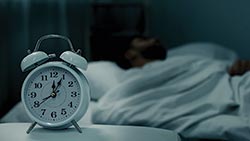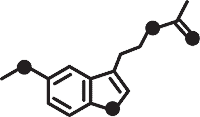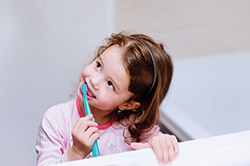If you thought melatonin was just a natural sleep aid, you would not be alone. Discovered in animals in 1948, and some years later in plants, this hormone has long been known to assist in regulation of your internal clock known as circadian rhythm. Manufactured in the tiny pineal gland in your brain, it helps sensitize your brain to darkness. This is different from the knockout drugs you may be familiar with. They are designed specifically to put you to sleep, even though they do not lead to restorative brain waves like natural sleep does. Melatonin makes it easier for you to fall asleep and stay asleep in a dark environment. But it won’t put you to sleep when you are surrounded by light, whether the light comes from the sun in the daytime or electric lights at night. Peak production of the hormone occurs at 2 am as long as your sleep quarters are pitch black. Any light in the room, even a tiny portable appliance charging light, decreases your brain’s melatonin production. The only exception to this is red light. If you need a night light to keep yourself from stumbling on the way to the bathroom, make sure it is red. Blue light is especially bad for production, so it’s best to avoid screens of any kind (televisions, phones, tablets, etc.) within two hours of bedtime.
Unfortunately, melatonin production declines with age. It is highest in infants, starts to taper in your teenage years, takes a nosedive in your thirties, and drops to 10% of its peak by the time you hit sixty. This may be one reason why the elderly have more difficulty getting to sleep and staying asleep. You may find that taking melatonin as a supplement enables you to fall asleep more easily. If not, you may need to work with someone knowledgeable in proper dosing of this hormone. Or your problem may simply not be melatonin deficiency at all. Insomnia has numerous causes, including mineral imbalances, menopause, testosterone deficiency, adrenal dysregulation, yeast overgrowth, parasites, anxiety, depression, stress, prescription and over-the-counter medicines, post-traumatic stress disorder, toxins, poor sleep habits, electromagnetic interference (cell phones in the room and wi-fi in the neighborhood), amino acid deficiencies, and much more. Suppose, on the other hand, that you do respond to supplementation but awaken within a couple hours. What then? This often occurs because half of the melatonin you take is already gone within 45 to 60 minutes. By two hours, your brain only has access to one-fourth or less of the dose you took. It degrades quickly.
Your brain makes melatonin from the amino acid tryptophan, which comes from foods such as cheese, chicken, eggs, fish, milk, and turkey. Before it becomes melatonin, it has to be converted into 5-HTP and then serotonin. This is about where most people’s knowledge about this hormone ends. Popular websites that come up on the first page of any internet search fare no better, even those hosted by university health systems. This is because few people, even “experts”, study the U.S. National Library of Medicine database. It turns out that melatonin is so important that it is made in nearly every cell in the body, in little powerhouses called mitochondria. Moreover, after you eat, your intestines produce four hundred times as much as your pineal gland does. They need it to stimulate the processes of digestion and elimination.
With melatonin being produced everywhere in the body, you can imagine it must be pretty important, and for a lot more than sleep. And you would be right. Mitochondria, which convert oxygen, carbohydrates, and fats into energy for each cell, make a lot of free radicals in the process. If let loose, these dangerous molecules will damage and eventually kill the cell, or turn it into a cancer cell. Fortunately, melatonin and other antioxidants (from plants you eat) are nearby to neutralize the free radicals. Each molecule of melatonin is so powerful, in fact, that it can eliminate ten free radicals.
So far, we have seen that melatonin helps with sleep and functions as an antioxidant inside cells. It is also critical for rejuvenation, repair, immune-boosting, calming inflammation, protecting brain cells, preventing damage to DNA, improving mitochondrial energy production, and improving thyroid function. The more it is studied, the more we find out it does.
You might be surprised to learn that the National Library of Medicine houses over 30,000 reports on the uses of this amazing and underappreciated hormone. Did you know that it makes it harder for viruses to grow and spread? Yes, thousands of doctors throughout the U.S. and internationally have used melatonin as part of their COVID-19 protocols, for example. Many have published their successes in a variety of medical journals. Studies have also demonstrated benefit in jet lag, autism, ADHD, heart disease, Parkinson’s, Alzheimer’s dementia, macular degeneration, chronic infections, multiple sclerosis, and even cancer. The hormone interferes with the growth and spread of cancer cells in at least eight different ways. While no one would advocate trying to treat cancer with melatonin alone, it is a proven team player in a coordinated, multi-faceted approach to this and many other diseases.
When we use melatonin for many of these purposes, we use much higher doses than you would typically use to help you get to sleep at night, and much higher than you can find at local stores or even on the internet. Fortunately, melatonin is extremely safe. You cannot overdose on it. Some people experience side effects such as wild dreams, restlessness, or grogginess in the morning. Most of the time this occurs because they are not using the right dose. Other times it is due to the manufacturer adding unnecessary ingredients to the capsule. In fact, 99% of melatonin supplements have been found to be synthetic, made using petrochemicals and containing varying amounts of contaminants. In other words, you have to be careful when looking for the right product. And you need to remember that melatonin is not an FDA-approved drug. This means that, even though there are mountains of research demonstrating its benefits, sellers cannot claim that it diagnoses, treats, or cures any disease. Moreover, none of this information serves as medical advice or replaces the advice of your trusted physician.
If you are interested in finding out if melatonin might be right for you, call (435) 210-0184 for a consultation to address your specific needs.
|
Oral healthcare for children starts from the moment they're born. Children will expose themselves to millions and billions of germs, microbes, and bacteria as they develop. Establishing strong oral healthcare practices during their developmental stages will ease the stress and hassle of oral care later.
Infant Care
Infant oral health requires gently rinsing or washing their mouths after each feeding. The child will become accustomed to the process using a warm, soft cloth. The gentle rinsing or washing also removes any milk that may settle along the gum line or in the crevices of newly grown teeth, and pockets of milk can encourage tooth decay.
Most infants have their first tooth by the time they are six months old. Once teeth start to arrive, use a soft-bristled toothbrush with very little toothpaste (less than a pea size). Silicon brushes are soft on an infant's gums, and if they bite them while brushing, there is less chance of injury to the mouth.
Toddlers' Oral Hygiene
Toddlers are independent by nature, and a soft toothbrush is necessary to help them create lasting dental care habits. Medium and hard-bristled toothbrushes can be hard on the sensitive tissue inside a toddler's mouth. Silicon and soft-bristle brushes remove germs and sugars from smaller teeth easily. As the children grow, reminding them to rinse well and use floss between teeth will increase their oral health.
The American Dental Association recommends two minutes of brushing twice daily for optimal results. Teach your toddlers to time their brushing to remove as much buildup as possible. Most dentists offer two-minute timers with their check-up kits. You can also find them in many grocery stores or online.
The Pre-teen Challenge
Many pre-teens are looking for ways to control their environment, and dental care often becomes a victim of these battles. Encourage them to continue routine brushing and flossing by making it a challenge. Introduce children over six to fluoride-enriched mouthwash. Teach them the proper way to gargle and remind them not to swallow.
Some toothpaste manufacturers are creating exciting dental care kits that your pre-teen will enjoy. Rewards for not skipping or letting them choose their own toothpaste and toothbrushes are just a few ways to engage them. There are also battery-operated toothbrushes and water picks that allow kids to make the chore a game.
Teen Angst
In a perfect world, teenagers would joyfully take care of their dental hygiene daily. Reminding them seems to cause a whole world of stress for everyone involved. Don't give up. Ask your teen for their input on the items they think are necessary for their oral care. Choosing their dental products often encourages them to establish personal routines that are responsible and consistent. Keep supplying them with their favorite toothpaste and comfortable toothbrushes. Keep extra batteries or replacement brushes available for electric brushing, and remind yourself that this too will pass.
Parents set the example, so include the child in the discussion, so they are comfortable giving opinions and discussing issues with the dentist. Schedule routine six-month cleanings and talk openly about dental care. Ask questions and point out any concerns in the growth of teeth, lack of teeth, spacing, and discoloration as soon as possible.
The American Dental Association encourages routine check-ups from six months on. Make regular dental visits part of your child's routine as they grow up. Once oral hygiene becomes a habit, they will ask questions and engage the dental staff. Encourage these interactions and promote independent choices that will last a lifetime.
|